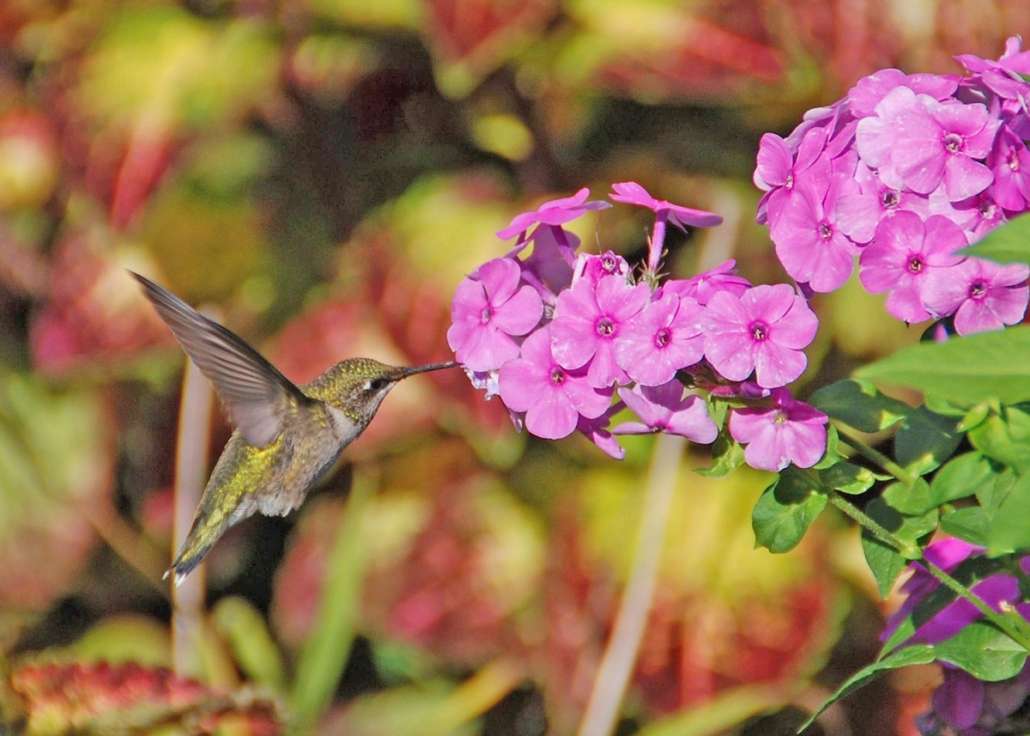SMALL SPACE GARDENING: Plan and plant a hummingbird garden
 by Melinda Myers
by Melinda Myers
Whether you are making some late additions to your gardens or planning for the future include some hummingbird-favorite plants. Select plants and create combinations to attract and support them with a season-long supply of nectar.
Hummingbirds consume an average of two to three times their weight in nectar each day. Providing feeders and an abundance of flowers throughout the season will support the hummingbirds and help attract them to your gardens. Keep this in mind as you add plants to your landscape.
Shrubs like azalea, lilac, weigela, buttonbush, and Rose-of-Sharon provide shelter for birds and nectar-filled flowers for hummingbirds and other pollinators to enjoy. The North American native honeysuckle vine adds vertical interest and hummingbird appeal even in small spaces. Major Wheeler is a cultivar of the native honeysuckle vine that blooms all summer and is more resistant to powdery mildew. Watch as the hummingbirds munch on any aphids that attack this plant. They are great pest managers to have in the garden.
Another native vine, the trumpet vine, is a vigorous grower that can be trained into a small tree or onto a trellis. This plant will send out suckers requiring some regular maintenance. Be patient as it can take several years for this vine to begin flowering. Avoid overfertilization which results in an even bigger plant and no flowers.
Shorter vines, like the hummingbird’s favorite cardinal vine, make excellent thrillers in containers. Train them onto a decorative support and grow them in their own pot or combine them with other annuals.
Include perennials for added seasonal beauty and nectar. Early blooming lungwort is shade tolerant and provides some of the earliest nectar for these winged beauties. Leave the white or lavender flowers on your hostas for the hummingbirds. This popular shade-tolerant plant is often overlooked for its hummingbird appeal.
Garden phlox and bee balm are both hummingbird favorites that add color and nectar to the summer garden. Look for powdery mildew-resistant varieties or plant them among other tall plants to hide any discolored foliage that may occur. North American native anise hyssop and liatris are two more favorites you may want to include.
Fill vacant spots in the garden, containers, or hanging baskets with annuals known to attract hummingbirds. Fuchsias, begonias, and impatiens are perfect for shady locations. Cupheas are often sold under the common names, tiny mice and cigar plant, and prefer a sunnier location. The taller blue horizon ageratum, geranium, bidens, tall verbena, and petunias grow well in gardens and containers.
Both perennial and annual salvias attract hummingbirds. Place a pot or two of Black and Blue, Black and Bloom, and Wendy’s Wish near your windows, so you can enjoy the frequent visits of your resident hummingbirds.
Add one or more feeders to your landscape. Provide space between the feeders as hummingbirds are territorial. Make sure there is cover within 10 to 15 feet. Fill the container with a 1-part sugar to 4-part water solution. Replace the mixture and clean the feeders every few days. This provides additional food for the hummingbirds and viewing opportunities for you.
It may take a couple of years for the hummingbirds to find your nectar-filled garden. In the meantime, you will enjoy the flowers and other pollinators that stop by to dine.
Melinda Myers has written more than 20 gardening books, including the recently released Midwest Gardener’s Handbook, 2nd Edition, and Small Space Gardening. She hosts The Great Courses “How to Grow Anything” instant video and DVD series and the nationally syndicated Melinda’s Garden Moment TV & radio program. Myers is a columnist and contributing editor for Birds & Blooms magazine and her website is www.MelindaMyers.com.
Responsible journalism is hard work!
It is also expensive!
If you enjoy reading The Town Line and the good news we bring you each week, would you consider a donation to help us continue the work we’re doing?
The Town Line is a 501(c)(3) nonprofit private foundation, and all donations are tax deductible under the Internal Revenue Service code.
To help, please visit our online donation page or mail a check payable to The Town Line, PO Box 89, South China, ME 04358. Your contribution is appreciated!



Leave a Reply
Want to join the discussion?Feel free to contribute!